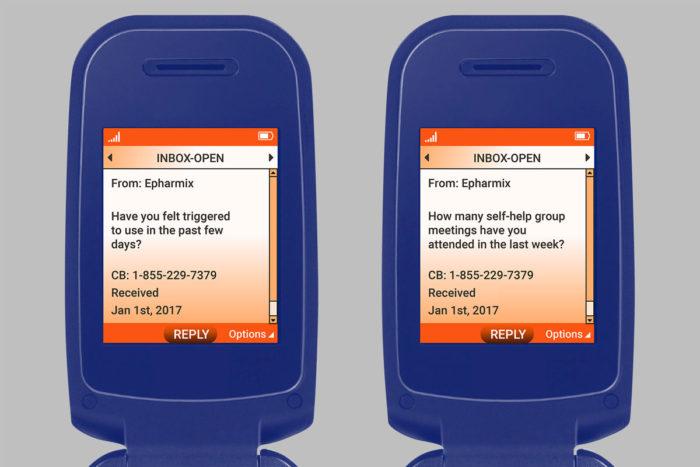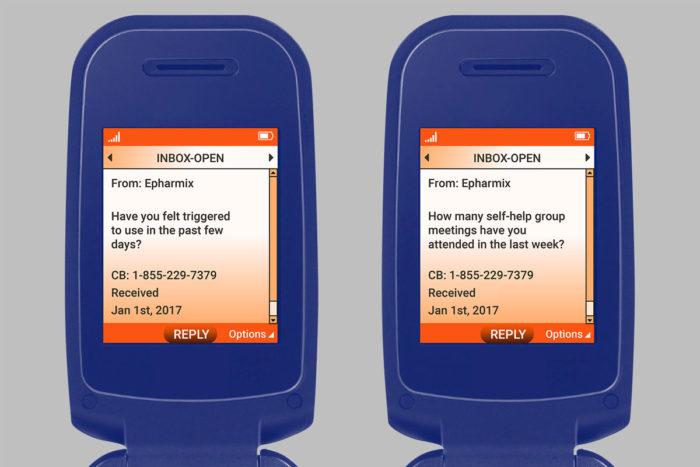
Credit: Epharmix
A new automated text messaging service may curb opioid abuse and reduce the likelihood of relapse while also decreasing treatment costs, according to researchers at Washington University School of Medicine and Epharmix, a St. Louis-based digital health company.
The service provides automated text messages and phone calls to patients being treated for opioid addiction. Such messages ask patients if they're feeling OK or struggling with potential relapse. Patients also can activate a panic button for immediate help.
Time saved from monitoring patients through individual phone calls and in-person appointments may trim medical costs and permit health-care workers to treat more patients without accruing heavier workloads.
Findings of the small study are published April 17, 2018, in NEJM Catalyst, a publication of The New England Journal of Medicine Group.
"There is an urgent need to address the opioid crisis in powerful new ways," said the study's senior author, Avik Som, an MD/PhD student at Washington University. Som, who has completed his doctorate in biomedical engineering and will receive his medical degree in May, helped develop the text-messaging technology as chief medical officer at Epharmix, a digital health company he founded with classmates in 2015. The company creates mobile technologies aimed at managing chronic conditions such as diabetes, depression and hypertension.
"With the opioid epidemic, time is of the essence because of how quickly it's grown and the lives that are lost," Som said.
Nearly 100 people die each day due to opioid overdoses, according to the Centers for Disease Control and Prevention. A highly addictive class of drugs, opioids include prescription painkillers, heroin and fentanyl.
The mobile technology is designed to supplement cognitive behavioral therapy, support services and other treatments aimed at combating opioid addiction. "This is not meant to replace important programs or face-to-face contact between patients and providers," Som said. "Rather, it is an additional tool that is affordable and immediate. It doesn't require costly, time-consuming measures such as opening substance-abuse centers, and training and hiring new staff.
The 21 patients in the study began using the texting service in late 2016 as part of their treatment at Preferred Family Healthcare, a community-based organization in St. Louis that offers treatment for substance abuse.
Data collected via the text messaging service found that at the time of enrollment, nine patients (43 percent) reported substance abuse use in the previous three days, and nine patients (43 percent) reported no use, while the remaining did not respond. After three months, half of the 21 total patients reported no substance use, while the number of patients using dropped to two (10 percent). The researchers can't attribute the positive trend solely to the app but said the data are encouraging.
"Opioid users face strong urges to relapse because of the addictive power of the drug," Som said. "As a result, health-care workers struggle to keep patients engaged."
Patients and caregivers reported that they preferred the ease and familiarity of text message communication. "Texting is convenient, immediate and nonjudgmental," Som said. "It has become an integral part of how we communicate in society. Patients reported feeling more connected to health-care providers."
The service includes a "panic button" for patients facing relapse or other health struggles. Once the button is activated, health-care workers phone patients and provide counseling, scheduling for in-person appointments, or other resources.
Additionally, texts allow caregivers to monitor patients daily with automated questions such as "Have you used in the last day?" and "Have you had urges to use?" Patients who reported struggling received automated follow-up questions that classified their risk for relapse as high, moderate or low. At the same time, health-care workers were alerted to intervene immediately.
"Health-care providers can be proactive," Som said. "It is so much more powerful to curb the temptation and break the cycle in advance of relapse rather than providing treatment only after the event has occurred."
The patients in the study were on Medicaid and individually had accrued more than $20,000 in medical costs related to substance abuse and other health issues. Researchers calculated that per-patient costs for caregiver services specific to addiction-related care would drop 19 percent, from $926 annually to $753.
Reduced costs from staff time savings were attributed to the texting service, enabling more efficient patient follow-up and better targeting to provide treatment to the right patients. "Cost savings could be realized with this tool as opioid addiction continues to rise and caregivers increasingly are being asked to manage additional patients," said the study's first author, Jordan Feltes, an Epharmix researcher and a second-year medical student at Saint Louis University.
Further studies will allow researchers to examine the text-messaging strategy in a larger patient group, and better gauge potential savings in Medicaid funding and related costs.
"In the midst of this national emergency, it is critical that patients and providers have clear, open channels of communication in order to mitigate the devastating impact of the opioid crisis," said Will Ross, MD, associate dean for diversity and a professor of medicine at Washington University. He mentored the researchers as principal investigator for Epharmix.
###
Media Contact
Diane Duke Williams
[email protected]
314-286-0111
@WUSTLnews
Original Source
https://medicine.wustl.edu/news/text-messaging-tool-may-help-fight-opioid-epidemic/





